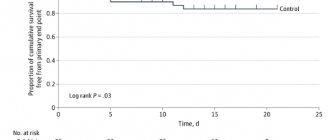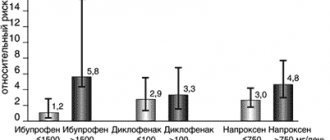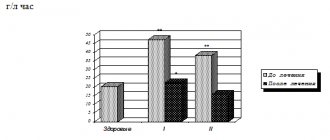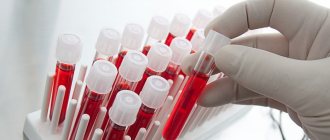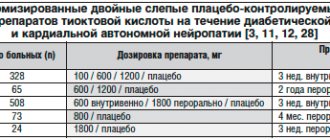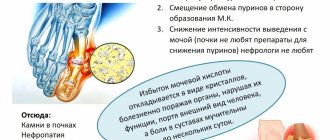Pharmacodynamics and pharmacokinetics
The main component of the medicine is acetylsalicylic acid (some mistakenly call it acetylic acid). The pharmaceutical drug belongs to anti-inflammatory medications.
It is useful to know that Aspirin and acetylsalicylic acid are the same thing.
C9H8O4 is the chemical formula of Aspirin.
Taking Aspirin in a dosage of 300 mg to 1 mg helps eliminate joint and muscle pain. In addition, a similar dose of the drug helps to improve well-being during colds and flu, and helps with fever.
Acetylsalicylic acid is suitable for the treatment of acute and chronic inflammatory diseases.
It is advisable to take aspirin for:
- Bekhterov's diseases
- Osteoarthritis
- rheumatoid arthritis
For the above diseases, doctors prescribe higher doses of the drug than when fighting colds and high body temperature. Based on the specific course of the disease, patients are prescribed 4-8 g of medication per day.
Aspirin is also useful to take in the presence of many vascular diseases. In such cases, doctors recommend taking from 75 g to 300 mg of the substance daily (depending on the nature and danger of the disease).
Pharmacokinetics
After consuming the medicine, the active substance is rapidly and completely absorbed from the stomach. During and after absorption, it is converted to salicylic acid (the main active metabolite).
Decomposition products are primarily excreted through the kidneys.
New data on the role of acetylsalicylic acid in the treatment of COVID-19
On June 15, during “Scientific Tuesday,” the head of the department of fundamental and clinical problems of thrombosis in non-infectious diseases of the Federal State Budgetary Institution “National Medical Research Center for Traumatology and Medicine” of the Ministry of Health of Russia, Doctor of Medical Sciences. Igor Semenovich Yavelov presented data from randomized clinical trials on the use of acetylsalicylic acid in the drug therapy of COVID -19.
It has been proven that thrombus formation processes play a significant role in the progression of the new coronavirus infection. Currently, subcutaneous or intravenous administration of heparin drugs is widely used in the hospital for the treatment of COVID-19. However, evidence is accumulating that drugs that reduce the functional activity of platelets (antiplatelet agents) may also be useful, among which acetylsalicylic acid is most often used.
Thus, according to a pooled analysis of 6 retrospective studies, which included a total of 13,993 patients with COVID-19, the use of a low dose of acetylsalicylic acid prehospital or in the hospital indicated a twofold reduction in the risk of death when compared with those who did not receive this antiplatelet agent, regardless of the presence of other factors, associated with an unfavorable outcome of the disease. The results of the analysis of cases of initiation of acetylsalicylic acid use in a hospital were similar. At the same time, on the one hand, such a pronounced positive effect looks implausible, on the other hand, it is known that evidence of this kind can be misleading, since the decision to prescribe or not prescribe a drug to a particular patient depends on the decision of the doctor, whose motives are not always known , and there is never any certainty that the comparison groups were similar (comparable) in all features that could influence the outcome of treatment. Only randomized clinical trials can give a definite answer to the appropriateness of a particular approach to treating patients.
The results of the first of them were disappointing: in the multicenter open clinical trial RECOVERY, the administration of acetylsalicylic acid at a dose of 150 mg 1 time per day before discharge in patients hospitalized with COVID-19 had no effect on mortality over 28 days of observation compared with standard treatment of the disease. without the use of acetylsalicylic acid. However, there was no benefit when starting treatment within the first 7 days and later from the onset of symptoms, in the absence of the need for respiratory support/oxygen breathing and various forms of respiratory support, with or without the use of corticosteroids. There were no differences between groups in the frequency of patients requiring non-invasive and invasive pulmonary ventilation or renal replacement therapy. In general, the study began in the first days after hospitalization, and initially the severity of the disease was not critical (mechanical artificial ventilation was performed in only 5% of patients).
As a result, there is no reason yet to use acetylsalicylic acid in all patients hospitalized with COVID-19. Its study in this disease (including outpatient treatment) continues in a number of randomized clinical trials. Accordingly, it is possible that after new facts emerge, ideas about the role of acetylsalicylic acid in COVID-19 will be clarified or revised.
Indications for use of Aspirin
Acetylsalicylic acid is a symptomatic drug that should be taken for:
- pain
- inflammation
- feverish
Indications for use:
- toothache
- headache
- muscle and joint pain
- algomenorrhea
- sore throat due to a cold
- back pain
- cold
- ARVI
- Pain of moderate severity arising from inflammation of the joints
Acetylsalicylic acid: use, indications
Acetylsalicylic acid (ASA) is a drug that has an analgesic, antipyretic, anti-inflammatory and antiplatelet (prevents the formation of blood clots) effect. The World Health Organization has included ASA in the list of essential medicines. Its mechanism of action has been well studied, and it has been successfully used for many years in the treatment and prevention of cardiovascular diseases. In this article we will take a closer look at how the use of acetylsalicylic acid helps prevent the formation of blood clots, the development of myocardial infarction and stroke.
Indications
Primary prevention of cardiovascular diseases (CVD)
Acetylsalicylic acid helps prevent the development of thrombosis and acute heart failure. It can be prescribed to those people whose risk of developing these diseases is increased. The likelihood of developing thrombosis and heart failure increases:
- smoking;
- old age (40 years and older);
- obesity;
- arterial hypertension;
- hyperlipidemia (abnormally increased levels of fats and fat-like substances in the blood);
- diabetes.
Prevention of recurrent myocardial infarction and thrombosis
The use of acetylsalicylic acid can be recommended for people already suffering from heart and vascular diseases.
Unstable angina
The use of acetylsalicylic acid helps prevent the formation of a blood clot in a vessel and reduce the risk of developing myocardial infarction in patients with unstable angina - a condition when the blood supply to the heart muscle is deteriorated, usually due to the formation of “cholesterol” plaques on the walls of blood vessels.
Use for the prevention of thrombosis: mechanism of action
Acetylsalicylic acid reduces the risk of blood clots in blood vessels. Let's take a closer look at how this happens. A thrombus is essentially a clot of coagulated blood. In the process of its coagulation, special cells called platelets play an important role. By aggregating, i.e. sticking together, they help to form a blood clot. Acetylsalicylic acid prevents their adhesion, partially or completely preventing the formation of special biologically active compounds in cells - thromboxanes. These compounds are responsible for platelet aggregation. When thromboxanes are not produced in sufficient quantities, platelet aggregation decreases, which means the risk of blood clots decreases. Thus, the use of acetylsalicylic acid helps prevent blockage of blood vessels, which can result in myocardial infarction or stroke.
TROMBITAL for the prevention of thrombus formation in the presence of risk factors for the development of CVD
Drugs for the prevention of heart attack and stroke are TROMBITAL and TROMBITAL FORTE. Acetylsalicylic acid in their composition prevents the formation of blood clots, and magnesium hydroxide protects against the irritating effect of ASA on the gastric mucosa. This combination of components increases drug tolerability and improves the safety profile.
TROMBITAL
- Intended for the prevention of stroke, myocardial infarction and thrombosis in people at risk (elderly, smokers, diabetics, obesity, etc.).
- Contains ASA at a dosage of 75 mg and magnesium hydroxide 15.2 mg.
- The use of acetylsalicylic acid for primary prevention can reduce the risk of heart attack by 36% and stroke by 24% 2, 3.
TROMBITAL FORTE
- Intended for secondary prevention of myocardial infarction and stroke in patients with cardiovascular diseases.
- It differs from Trombital in its enhanced composition: 150 mg of ASA and 30.4 mg of magnesium hydroxide.
- The use of acetylsalicylic acid for secondary prevention can reduce the incidence of heart attacks by 4 times, the risk of stroke by 2.5, and the probability of death from cardiovascular diseases by 8 times 4, 5, 7.
Just one tablet a day!
TROMBITAL and TROMBITAL FORTE can be taken once a day 6. This is very convenient, because you do not need to remember throughout the whole day how many tablets you have already taken and how many are left to take.
- If there are risk factors, according to the instructions for medical use of Trombital and Trombital Forte
- Hanson I, Zanzetti A, Carruthers SG et al. Effect of rapid blood pressure lowering and low-dose aspirin in patients with hypertension: main results of a randomized trial. Optimal treatment of hypertension. Lancet. 1998; 351:1755–1762. Hansson L, Zanchetti A, Carruthers SG, Dahlöf B, Elmfeldt D, Julius S, Ménard J, Rahn KH, Wedel H, Westerling S. Effects of intensive blood-pressure lowering and low-dose aspirin in patients with hypertension: principal results of the Hypertension Optimal Treatment (HOT) randomized trial. HOT Study Group. Lancet 1998;351:1755–1762
- Ridker P. M., Cook N. R., Lee I. M., Gordon D., Gaziano J. M., Munson J. E., Hennekens S. H., Baring J. E. Randomized trial of low dose administration aspirin in the primary prevention of cardiovascular diseases in women. New England Journal of Medicine. 2005 Mar 31;352(13):1293-304. Ridker PM1, Cook NR, Lee IM, Gordon D, Gaziano JM, Manson JE, Hennekens CH, Buring JE. A randomized trial of low-dose aspirin in the primary prevention of cardiovascular disease in women.N Engl J Med. 2005 Mar 31;352(13):1293-304. Epub 2005 Mar 7.
- Theroux P. et al. Aspirin, heparin and their combination in the treatment of acute unstable angina. New England Journal of Medicine. 1988 Oct 27;319(17):1105-11. Théroux P, Ouimet H, McCans J, Latour JG, Joly P, Lévy G, Pelletier E, Juneau M, Stasiak J, deGuise P, et al. Aspirin, heparin, or both to treat acute unstable angina. N Engl J Med. 1988 Oct 27;319(17):1105-11.
- Fields V. S. et al. A controlled study of aspirin in cerebral ischemia. Stroke. 1977, May–June; 8(3):301-14. Fields WS, Lemak NA, Frankowski RF, Hardy RJ. Controlled trial of aspirin in cerebral ischemia. Stroke. 1977 May-Jun;8(3):301-14.
- In accordance with the instructions for medical use of the drugs TROMBITAL and TROMBITAL FORTE.
- Kubota N. et al. Statin and aspirin therapy improves long-term outcomes of percutaneous coronary intervention. Heart and blood vessels. 2008 Jan;23(1):35-9. Kubota N1, Kasai T, Miyauchi K, Njaman W, Kajimoto K, Akimoto Y, Kojima T, Ken Y, Takeshi K, Hiroyuki D. Therapy with statins and aspirin enhances long-term outcome of percutaneous coronary intervention. Heart Vessels. 2008 Jan;23(1):35-9.
Contraindications for Aspirin
Prohibitions on taking Aspirin are divided into two types:
- Relative
- Absolute
Taking Aspirin is strictly prohibited if you are allergic to acetylsalicylic acid or other non-steroidal anti-inflammatory drugs. In addition to all this, the drug should not be used if there is an increased tendency to bleeding.
Relative contraindications:
- Bronchial asthma
- Combined use of anticoagulants
- Breast-feeding
- Pregnancy
- Chronic stomach diseases
- Kidney dysfunction
- Diabetes
- Age up to 12 years
If there are relative prohibitions, taking the medicine is possible only after approval by the doctor.
Thrombo ACC and analogues. What to look for when choosing acetylsalicylic acid?
There are many drugs of acetylsalicylic acid (ASA), or aspirin, used in cardiology and neurology. You probably have questions: “Which is better?”, “What to choose?”. Let's discuss the main differences between the drug Thrombo ACC and some other ASA drugs.
The effectiveness of which ASA drugs has been most studied?
Acetylsalicylic acid is one of the most studied drugs. The use of ASA reduces the risk of myocardial infarction by 34%, stroke by 25%, and death from vascular causes by 15% [1]! At the same time, the most impressive results are shown for enteric-coated forms (Trombo ACC refers specifically to such forms). Other “improved” forms of aspirin, including those combined with magnesium hydroxide (such drugs include Cardiomagnyl, Magnicor, etc.), have a much smaller evidence base [2].
Which ASA drugs have demonstrated better tolerability?
The main side effects of ASA relate to the gastrointestinal tract: the formation of erosions, ulcers, bleeding. This contributed to the development of “improved” forms of aspirin: enteric-coated, containing so-called antacids (magnesium hydroxide), etc. The presence of an enteric coating allows the drug to dissolve in the intestines, bypassing the stomach. The most convincing evidence of a more gentle effect on the gastric mucosa was obtained specifically for enteric-coated forms. Thus, with long-term use of such forms of ASA, the incidence of gastric erosions is 1.5 times less than when taking regular aspirin [2]. In contrast, antacid formulations of ASA have not demonstrated any benefit over conventional aspirin formulations [3].
What dosage of aspirin is considered most appropriate for long-term preventive use?
The doctor determines the appropriate dosage of ASA and the duration of treatment for each patient. Studies have proven that the administration of low doses of ASA (75–150 mg/day) for long-term therapy is accompanied by the highest effect. This reduces the risk of developing adverse events from the gastrointestinal tract [2]. Thrombo ACC is available in dosages of 50 and 100 mg.
Price
Both according to pharmacoeconomic analysis [5] and when comparing pharmacy prices [6, 7], Thrombo ACC is several times more profitable than another enteric-coated ASA drug, Aspirin-Cardio.
Thus, Thrombo ACC:
- is available in the form of enteric-coated tablets - this form is the most studied and also has better tolerability with long-term use;
- Available in two dosages - 50 and 100 mg in packages of 28 and 100 tablets;
- based on a monthly course, it is several times cheaper than another enteric-coated ASA drug (Aspirin-Cardio) [5-7].
Before taking any medicine, you should consult your doctor and familiarize yourself with the contraindications specified in the instructions for medical use.
Used sources:
(1) Antithrombotic Trialists' Collaboration, Collaborative meta-analysis of randomized trials of antiplatelet therapy for prevention of death, myocardial infarction, and stroke in high-risk patients BMJ, 2002. 324(7330): p. 71-86.
(2) Rafalsky V.V., Krikova A.V. Clinical pharmacology of acetylsalicylic acid and features of dosage forms are the key to effective and safe use for the prevention of thrombosis. Medical advice. 2016;(5):26-33
(3) Garcia Rodriguez, LA, S. Hernandez-Diaz, FJ de Abajo, Association between aspirin and upper gastrointestinal complications: systematic review of epidemiologic studies. Br J Clin Pharmacol 2001. 52: p. 563-71.
(4) Lotrionte, M., L. M. Biasucci, M. Peruzzi, G. Frati, A. Giordano, G. Biondi-Zoccai, Which Aspirin Dose and Preparation Is Best for the Long-Term Prevention of Cardiovascular Disease and Cancer? Evidence From a Systematic Review and Network Meta-Analysis. Progress in cardiovascular diseases, 2021. 58(5): p. 495-504.
(5) Makarova, E.I., G.A. Tolordava, E.E. Arinina, Pharmacoeconomic analysis of the drug Thrombo ACC in the treatment of patients with previous cardiovascular events. Pharmacoeconomics: Theory and Practice, 2015. 3(4): p. 69-74.
(6) . Thrombo Ass Tablets 100 mg No. 100, 43.00 rub. minimum, only 424 sentences:. 2021 ; Available from: (access date 07/31/2016).
(7) .
Aspirin Cardio Tablets 100 mg No. 20, 120.00 rub. minimum, only 11 sentence:. 2021 ; Available from: (access date 07/31/2016). RUS-GPS-THR-NON-10-2016-183
Side effects
Sometimes taking Aspirin can cause negative effects, these include:
- Pain in the stomach
- Decreased platelets in the blood
- Bronchospasm
- Various skin rashes
Taking Aspirin for a long time sometimes leads to the development of bleeding in the gastrointestinal tract. Signs characterizing this pathology:
- Anemia
- Tarry stool
- Weakness, excruciating abdominal pain
If the above symptoms appear, you should stop taking Aspirin and seek medical help.
Overdose
Signs of a moderate overdose include:
- Hearing impairment
- Headache
- Confusion
- Dizziness
- Noise in ears
If you reduce the dose of the drug, these symptoms will disappear.
In case of severe overdose, the following occurs:
- Ketosis
- Fever
- Respiratory failure
- Severe hypoglycemia
- Cardiogenic shock
With such symptoms, the patient is hospitalized in a hospital.
National Institute of Health (NICE) guidelines
Aspirin 75 mg is recommended from 12 weeks of pregnancy if there is at least one high risk:
- arterial hypertension in a previous pregnancy;
- chronic renal pathology;
- autoimmune diseases (such as APS);
- diabetes;
- chronic arterial hypertension.
Aspirin 75 mg is recommended from 12 weeks if there are two or more moderate risks:
- first pregnancy;
- age over 40 years;
- the interval between pregnancies is more than 10 years;
- family history of preeclampsia;
- multiple pregnancy;
- BMI>35.
